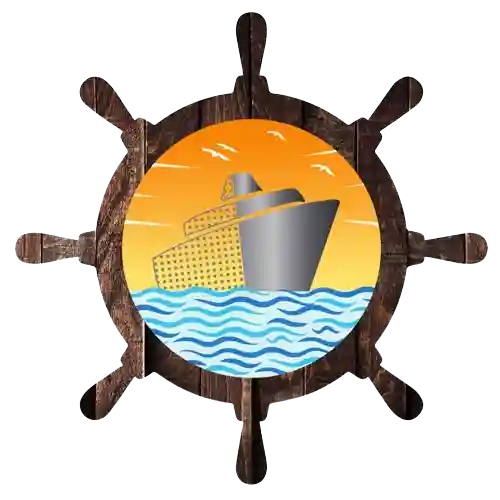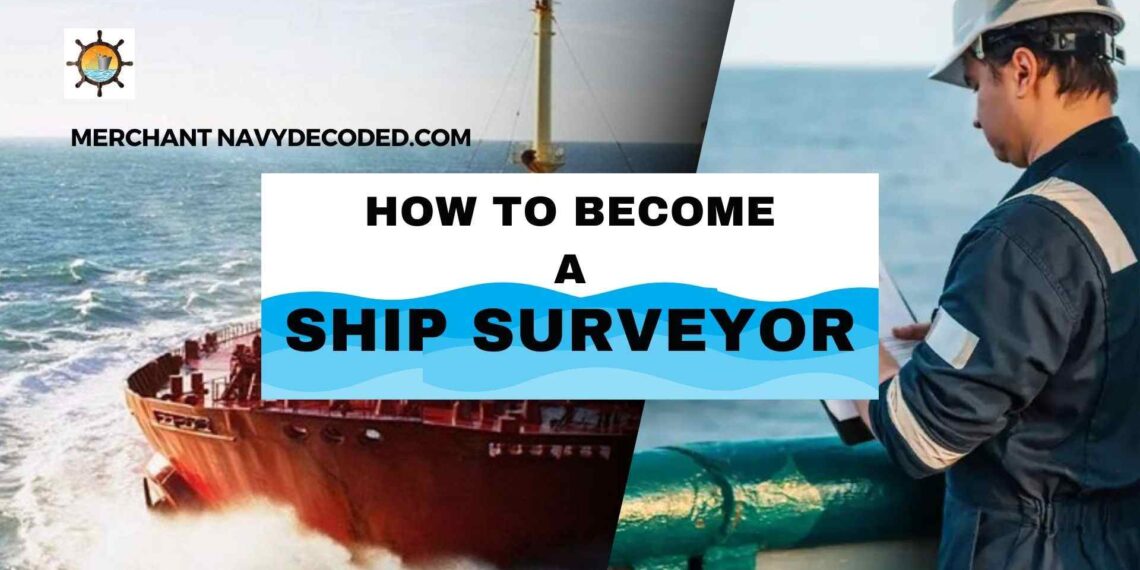How to Become a Marine Surveyor.
Overview
- Discover how deck officers can smoothly switch to Ship Surveyor, using their maritime knowledge.
- Learn about different surveying roles like checking cargo and marine warranty surveys, which offer interesting opportunities for specialization.
- Find out more opportunities that are available for seafarers in shore jobs with our free Ship to Shore Guidance Series.
Check out the complete process to become a Marine Pilot from Officer in the Merchant Navy with our dedicated blog in Merchant Navy Decoded.
1:- What is a Marine Surveyor.
- In the shipping industry, a marine surveyor plays a crucial role in assessing and ensuring the safety, compliance, and quality of ships, cargoes, and related marine activities.
- Marine surveyors act as independent inspectors, often employed by classification societies, maritime agencies, or working as freelancers. Their primary responsibilities cover a wide range of areas within the maritime sector.
- Surveyors play a vital role in maintaining safety, preventing accidents, and ensuring compliance with international regulations in the shipping industry.
- They contribute to risk assessment, quality control, and the overall efficiency of maritime operations. Their work is essential for protecting the interests of shipowners, insurers, and the general safety of seafaring activities.
2:- Types of Marine Surveyors
2.1:- Cargo Surveyor
- Inspects and assesses cargo to ensure it is stowed, secured, and transported safely.
- Verifies that cargo loading and unloading procedures comply with regulations and industry standards.
2.2:- Hull Surveyor:
- Examines the structural integrity of a ship’s hull.
- Check for any damage, corrosion, or wear and tear that could compromise the vessel’s seaworthiness.
2.3:- Marine Warranty Surveyor
- Provides independent assessments and verification of marine-related activities, often involving high-value or complex operations.
- Ensures that procedures and equipment meet industry standards and contractual requirements.
2.4:- Classification Society Surveyor
- Represents a classification society, which sets and maintains technical standards for the construction and maintenance of ships.
- Inspects vessels during construction and throughout their operational life to ensure compliance with classification rules.
2.5:- Owner-Side Inspector
- Represents the shipowner’s interests during surveys and inspections.
- Ensures that the ship complies with international regulations and contractual agreements.
3:- How to Become a Marine Surveyor.
The transition from deck officer to surveyor not only broadens horizons but presents a spectrum of career paths, allowing individuals to tailor their professional journey according to their preferences and aspirations. Here, we delve into the diverse opportunities awaiting those embarking on this transformative voyage.
3.1:- Joining a Company: Anchoring Your Career in Stability
- Choosing to join a reputable company offers the stability of a structured work environment. Here, surveyors become integral parts of organizations that specialize in maritime services.
- These companies may collaborate with shipowners, insurers, and other stakeholders, providing a steady stream of projects ranging from routine inspections to complex marine operations.
- Within a company, surveyors often find themselves on a defined career trajectory, starting with entry-level positions and gradually progressing to managerial roles.
- This path ensures exposure to various aspects of the maritime industry and the chance to specialize in specific surveying domains over time.
3.2:- Becoming a Freelancer: Sailing the Seas of Independence
- For those seeking a more independent and flexible career, the option of freelancing beckons. Freelance surveyors operate as independent contractors, offering their expertise to clients on a project-by-project basis.
- This path grants autonomy, allowing surveyors to choose the projects they undertake, set their schedules, and diversify their experiences.
- Freelancing often opens doors to a global marketplace, enabling surveyors to collaborate with international clients and navigate a varied and dynamic workload.
- While it demands entrepreneurial spirit and self-discipline, freelancing provides a unique opportunity to shape one’s career on one’s terms.
4:- Skills Required to Become a Marine Surveyor
4.1:-Navigational Proficiency
- Background in Seamanship: Deck officers bring an extensive understanding of navigation principles, vessel operations, and maritime regulations, laying a solid foundation for surveying tasks related to cargo movement and vessel maneuvering.
- Safety Mindset: Their ingrained commitment to safety protocols ensures a meticulous approach to inspections, with a keen eye on identifying potential hazards and vulnerabilities.
4.2:- Attention to Detail
- Vessel Inspection Expertise: Deck officers are accustomed to conducting thorough vessel inspections for safety and compliance. This attention to detail translates seamlessly into surveying roles, where a meticulous examination of cargo, hulls, and marine operations is paramount.
- Regulatory Adherence: Compliance with maritime regulations requires a sharp eye for detail. Deck officers’ familiarity with stringent safety standards positions them well for surveying roles that demand precision and adherence to guidelines.
4.3:- Communication Skills
- Effective Reporting: Deck officers are adept at conveying complex maritime information both verbally and in writing. This skill is crucial when generating comprehensive reports as surveyors, ensuring clear communication of findings, recommendations, and compliance issues to various stakeholders.
- Client Interaction: Surveyors often liaise with clients, shipowners, and regulatory bodies. Deck officers’ experience in communicating with diverse teams onboard facilitates smooth interactions in surveying scenarios.
4.3:- Problem-Solving Aptitude
- Quick Decision-Making: Deck officers are accustomed to making swift decisions in dynamic and challenging environments. This problem-solving aptitude proves invaluable when faced with unforeseen issues during surveys, enabling efficient resolution and risk management.
- Risk Assessment: The ability to assess risks and devise mitigation strategies is a skill honed by deck officers during their seafaring careers. This skill is directly applicable to the complex scenarios encountered in surveying, especially in roles such as marine warranty surveyors.
4.4:- Regulatory Knowledge
- Familiarity with Standards: Deck officers possess a deep understanding of international maritime regulations and classification standards. This knowledge proves instrumental in ensuring that surveyed vessels and operations align with the ever-evolving industry norms.
4.5:- Leadership Skills
- Team Coordination: Deck officers often lead teams on board, requiring effective team coordination. This leadership experience is transferable to surveying roles, especially in managerial positions where overseeing a team of surveyors is common.
5:- Marine Surveyor Courses

5.1:- Marine Surveying Courses
- International Institute of Marine Surveying (IIMS) Courses: IIMS offers a variety of courses covering different aspects of marine surveying, such as cargo, hull, and marine warranty surveying. These courses provide in-depth knowledge and practical insights, preparing deck officers for specialized surveying roles.
5.2:- Risk Management Certification
- Certified Marine Risk Professional (CMRP): A certification in marine risk management equips professionals with the skills to assess and mitigate risks associated with marine operations. This is particularly valuable for roles like marine warranty surveyors, where a comprehensive understanding of risk is essential.
5.3:- Cargo Handling and Stowage Courses
- Lloyd’s Maritime Academy – Cargo Handling and Stowage Course: Understanding the intricacies of cargo handling is crucial for cargo surveyors. This course provides insights into best practices, safety considerations, and compliance requirements in cargo operations.
5.4:- Project Management Certification
- Project Management Professional (PMP) Certification: As a marine surveyor who often oversees complex projects, acquiring project management skills is valuable. PMP certification equips professionals with the knowledge and techniques to manage projects efficiently.
6:- Marine Surveyor Salary
6.1:- Freelance Positions
- Daily Rates: Freelance surveyors often enjoy the flexibility of setting their daily rates. These rates can fluctuate, ranging from $600 to $800 or even higher, depending on factors such as expertise, specialization, and the complexity of the project.
- Annual Earnings: Annual earnings for freelance surveyors are variable and depend on factors such as the number of projects secured, the duration of contracts, and the demand for their specific skill set. Experienced freelancers can potentially achieve six-figure annual incomes.
6.2:- Company Positions
- Daily Rates: Surveyors employed by companies typically receive a fixed salary, which translates to a daily rate when calculated for a year. Daily rates for company-employed surveyors can range from $300 to $600, depending on factors such as experience, industry demand, and the company’s compensation structure.
- Annual Salaries: Annual salaries for company surveyors may start at around $30,000 to $40,000 for entry-level positions. However, as they gain experience and expertise, these salaries can climb to $80,000 or more for experienced professionals, particularly those in managerial roles.
As professionals ascend the ranks into management roles, the salary growth is not only reflective of their experience but also of their expertise in specialized surveying domains. The demand for seasoned professionals in these roles, coupled with the higher level of responsibility, contributes to a rewarding compensation trajectory for those navigating the managerial waters of surveying.
7:- Steps to Become a Ship Surveyor
7.1:-Maritime Job Portals
- How to Apply:
- Create a comprehensive profile on reputable maritime job portals.
- Upload a well-crafted resume highlighting relevant skills and experiences.
- Browse through posted Marine Surveying positions and apply directly through the portal.
- Where to Apply:
Maritime Jobs: Platforms like MarineLink, Sea Career, and Martide often feature Marine Surveying positions.
- General Job Portals: Explore broader job portals like Indeed or LinkedIn, filtering for maritime and Marine Surveying roles.
7.2:- LinkedIn Profile
In today’s interconnected professional landscape, a robust LinkedIn profile is more than a resume; it’s a dynamic showcase of skills, experiences, and aspirations. Here’s why a strong LinkedIn presence is crucial:
- Visibility:– Recruiters actively use LinkedIn to identify candidates. An optimized profile ensures visibility to the right audience.
- Showcasing Expertise:-Highlight maritime background, certifications, and relevant skills. Utilize the ‘Skills’ section to emphasize proficiency in navigation, safety protocols, and more.
- Engagement:– Share updates, articles, or insights related to the industry. Active engagement demonstrates ongoing interest and commitment.
- Job Preferences:– Use the ‘Open to Job Opportunities’ feature to signal discreetly to recruiters.
7.3:- Recruitment Agencies
- How to Apply:
- Register with maritime-focused recruitment agencies.
- Submit your resume and express your interest in Marine Surveying positions.
- Stay in regular contact with the agency for updates on potential opportunities.
- Where to Apply:
Agencies such as Spinnaker Global or Faststream often specialize in maritime recruitment.
8:- Conclusion
In conclusion, the transition from deck officers to surveyors represents a voyage into a realm of unparalleled opportunities and professional growth. Deck officers, equipped with their maritime expertise, find themselves standing at the helm of a dynamic industry where versatility is key.
Disclaimer :- The opinions expressed in this article belong solely to the author and may not necessarily reflect those of Merchant Navy Decoded. We cannot guarantee the accuracy of the information provided and disclaim any responsibility for it. Data and visuals used are sourced from publicly available information and may not be authenticated by any regulatory body. Reviews and comments appearing on our blogs represent the opinions of individuals and do not necessarily reflect the views of Merchant Navy Decoded. We are not responsible for any loss or damage resulting from reliance on these reviews or comments.
Reproduction, copying, sharing, or use of the article or images in any form is strictly prohibited without prior permission from both the author and Merchant Navy Decoded.



